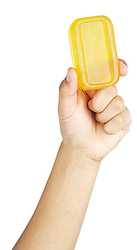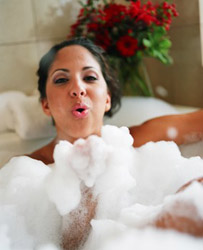All Soap is Not Created Equal:
The Health and Beauty Benefits of Natural Vs. Synthetic Soap
by www.SixWise.com
When you lather up with a bar or liquid soap, you’re counting on that soap to remove dirt and germs from your body while gently cleansing your skin. You certainly wouldn’t expect that very same soap to contain ingredients that could potentially cause far more damage than the germs you’re attempting to remove … yet if you use many commercial soaps, that is precisely what you’re getting.

Your family’s bar of soap likely contains ingredients that have never been tested for safety. |
In fact, research from the Environmental Working Group (EWG) found hat 57 percent of baby soaps -- certainly considered to be among the most pure and gentle soap there is -- contains 1,4-dioxane, a probable human carcinogen that readily penetrates your skin!
How can this be? Because the U.S. government does not require safety testing on the ingredients in your personal care products. As EWG explains:
“Cosmetics and other personal care products are an alarming example of government and industry failures to protect public health. Federal health statutes do not require companies to test products or ingredients for safety before they are sold. As a result, nearly all personal care products contain ingredients that have not been assessed for safety by any accountable agency, and that are not required to meet standards of safety.”
Common Toxic Ingredients in Synthetic Soap
Take a look at the soap and cleansers in your bathroom right now. If they contain any of the following ingredients, you may want to think twice about using them (the following ingredients are also among the top to AVOID when you’re looking for a new cleanser):
-
Triethanolamine: A fragrance ingredient and emulsifying agent that has been linked to cancer, immune system toxicity, allergies, organ system toxicity, and potential endocrine disruption.
-
Triclosan: This is the active ingredient in many antibacterial soaps. This chemical belongs to the chlorophenol class of chemicals, which are suspected of causing cancer in humans. According to the Environmental Protection Agency, triclosan is a pesticide and was given high scores both as a human health risk and an environmental risk.
-
Parabens and Phenols: Used in body wash and many other personal care products, according to the National Institutes of Health phenol is toxic and people who are hypersensitive to it could experience death or serious side effects at very low exposures. Parabens have also been linked to cancer and reproductive toxicity.
-
Phthalates: These industrial compounds are widely used in hairsprays, perfumes and cosmetics. Animal studies on certain phthalates have shown the chemicals may cause a variety of problems, including reproductive and developmental harm, organ damage, immune suppression, endocrine disruption and cancer.
In order to avoid harmful chemicals, you need to read the product's label before you buy. Avoid anything that has the chemicals listed above, including "paraben" (which may appear as methylparaben or others) or "phthalate" (which can be listed as dibutyl and diethylhexyl or just "fragrance").
What to Look for in a Natural Cleanser
Treat Your Skin to Pure Luxury With Vermont Organic Handmade Soaps!

Hypoallergenic Vermont Organic Handmade Soaps:
- Naturally Moisturizes and Conditions Skin
- High Glycerin Content and No Free Alkali
- Plant-based Oils (Palm, Coconut, and Olive)
- Certified Organic Natural Herbs, Spices, Botanical Concentrates, and Grains
- No animal testing ever
- No animal by-products except for the honey in the Honey & Cornmeal Soap
- Non-toxic
- Won't dry out your skin
- No Preservatives
- No Artificial Colors.
- Denser Bar Means Slow "Melting"- Can Last Twice as Long
- 100% Naturally Hypoallergenic
- No Sodium Lauryl Sulfate
- No detergents, alcohols, d-limonene, artificial fragrances
Meanwhile, Most Commercially Made Soaps:
- Dry the Skin: Due to Alkali Salts and Lower or No Glycerin Content
- Contain: Animal By-Products and/or High Percentages of Coconut Oil
- Contain: Artificial Fragrances, Preservatives, & Alcohols
- "Melt" Faster: Due to Lower Density & High Animal Fat Content
- Have Possible Allergenic Concerns
- Can Be Unkind to Environment
- Can be Toxic
- Are made with sodium tallowate (hydrogenated tallow using sodium hydroxide, water, and animal tallow) - it's cheap, processes quickly and produces a hard bar of soap.
- Strip away your skin's natural moisturizers.
- Use over 5,000 chemicals in personal care products.
- Are usually made in huge batches (250,000 pounds or more at a time)
- Remove their glycerin adding fillers including synthetic detergents
- The itchiness from these soaps is also due to the excess alkali left in the soap
Learn More About Vermont Organic Soaps & Order Today!
|
You should know that the government does not regulate what "natural" means in soaps labeled natural, so commercial soaps can freely claim to be natural while still using the synthetic compounds discussed above -- and they do.
So finding safe and toxin-free soaps and body washes is not as simple as looking for the "all-natural," organic" or even "hypoallergenic" label, as these products can still contain dangerous ingredients. The term "hypoallergenic" can actually mean whatever a particular company wants it to mean, according to the FDA.
A general rule of thumb? The fewer ingredients listed, the better. Some generally safe and gentle ingredients are:
If you're looking for the crème de la crème in natural body cleansers, you'll be delighted with Vermont Soap Organics' line of products. It was created to provide customers with high quality, natural personal care products -- nurturing for both you and the environment.
Vermont Soap Organics started in 1992 as a kitchen-size operation completely devoted to organic all-natural products, and is today the largest manufacturer of truly natural handmade soap in North America. They are also one of the first soap companies to ever receive organic certification.
Vermont Soap uses a modern version of an over 200-year-old method utilizing oils of palm, coconut, and olive, blended with an alkali solution. The batch is mixed for hours, thickening slowly. Botanical concentrates and organic herbs are added, then it is poured into wooden molds and kept warm for three days.
As the Vermont's soap solidifies, the alkali salts rise to the top. The soap is skimmed of excess alkali salts (a major irritant to sensitive skin often found in conventional bar soaps) cut into bars and cured for 3 weeks.
Often lasting about twice as long as conventional bars, Vermont Soap Organics soap is extremely moisturizing and soothing. Your skin will drink in the conditioning, moisturizing goodness of this handcrafted soap.
Anyone with sensitive or hypoallergenic needs can really benefit and find immediate relief using Vermont Organics soap as well. It's also a healthy, simple indulgence to help slow, relax and pamper yourself and your family.
Vermont’s luxurious bar soaps are available in eight different varieties for all skin types:
-
Butter Bar -- best dry skin bar
-
Citrus Sunrise -- all skin types
-
Honey -- gentle exfoliant for combination skin
-
Lemongrass … all skin types
-
Oatmeal Lavender … dry skin
-
Oats & Aloe … unscented for dry sensitive skin
-
Peppermint Magic … oily/combination skin
-
Woodspice … natural deodorant bar
Vermont Soap Organics even carries a safe and natural liquid soap! Seeking an alternative to commercial formulas, Vermont Soap began working with saponified (soap based) foaming concentrates, creating their own natural Aloe Castile Liquid Soap formula.
Their Castile Bath and Shower Gel is a blend of the unique Aloe Castile liquid soap along with a special extract of vegetable gum in glycerin. This process adds extra emollients to create a shower gel that is a natural, organic, rich alternative to many of the artificial, synthesized commercial formulas on the market today.
This all-natural bath and shower gel is available in five deliciously soothing scents, which will leave your skin feeling soft, moisturized, clean and refreshed -- without a trace of chemical residues.
Recommended Reading
11 Toxic Ingredients to Beware of In Typical Skin Moisturizers & The Safe Alternative
The Most Toxic Soaps and Shampoos Well Worth Avoiding
Sources
Environmental Working Group September 2008
Environmental Working Group February 8, 2007
SafeCosmetics.org
Environmental Working Group August 22, 2004